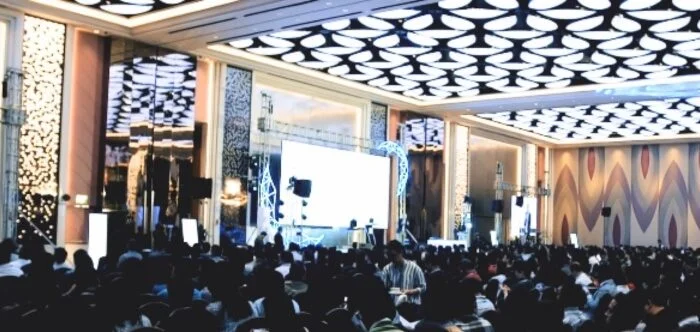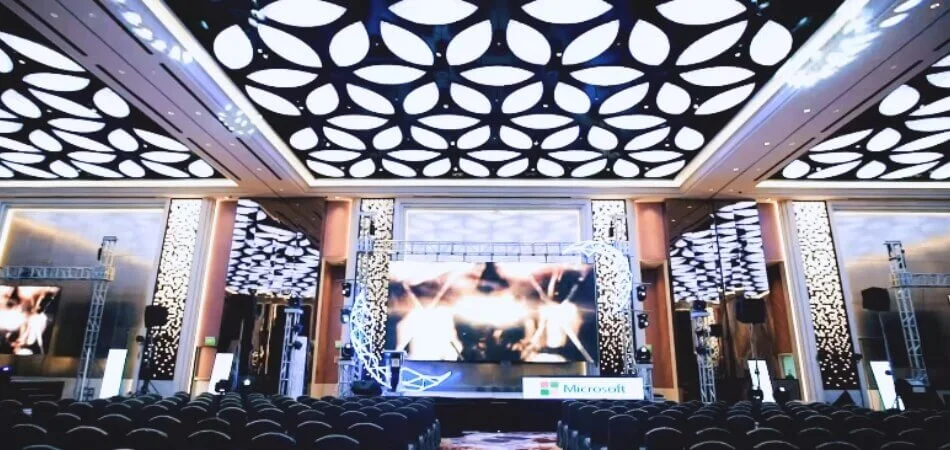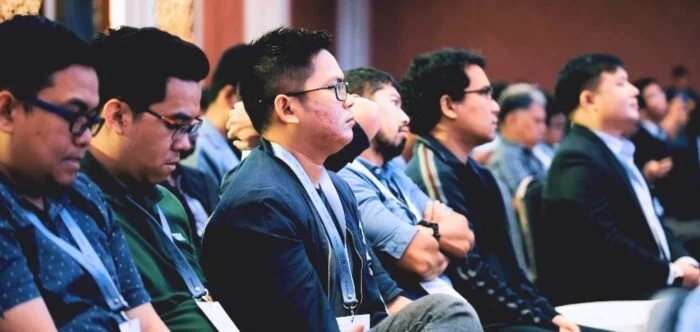Attending a conference can be a whirlwind of opportunities and experiences, especially for those keen on advancing their professional and personal growth. But the key question remains: What are you supposed to do at a conference? The key lies in a blend of strategic planning and enthusiastic engagement.
It’s essential to attend keynotes and sessions that align with your interests. Networking plays a crucial role, exchanging business cards, engaging in meaningful discussions, and connecting with other attendees opens doors to valuable professional relationships.
Exploring exhibition areas, actively participating in discussions, and engaging with presenters can provide insights and knowledge beyond the basic agenda. Remember, it’s an opportunity to learn, share ideas, and expand your professional network. For a deeper dive into making the most of your conference experience, continue reading our comprehensive guide.
What the Conference is About?
Conferences are dynamic platforms where professionals exchange ideas, insights, and innovations in a specific field. These events serve as a learning, networking, and professional development hub. Attendees benefit from a diverse range of activities and interactions.
The conference’s core revolves around presenting cutting-edge research, developments, and trends within the industry. Experts and thought leaders share their knowledge through keynotes and breakout sessions, offering valuable insights. These presentations often spark discussions, further enriching the learning experience.
Networking is another crucial aspect of any conference. It provides a unique opportunity for attendees to connect with peers, mentors, and industry leaders. This interaction fosters collaboration, opens new career avenues, and enhances knowledge sharing. The connections made here can lead to lasting professional relationships and collaborations.
Different Types of Conferences You Can Attend?
Conferences come in various forms, each catering to different professional needs and interests. They range from industry-specific gatherings to interdisciplinary forums, offering unique opportunities for learning and networking. Understanding the types of conferences available helps in selecting the most suitable one for your professional growth.
Academic Conferences
The academic conference is a cornerstone for educators and researchers when it comes to scholarly research and academic pursuits. Here, participants present papers, engage in scholarly debates, and attend lectures by experts in their field. These conferences are essential for staying updated with the latest research and academic trends. They also facilitate collaboration among scholars from diverse academic backgrounds.
Industry Conferences
With their specialized content, these conferences help you gain a deeper understanding of the trends, challenges, and innovations specific to your industry. Professionals gather to discuss market developments, share case studies, and explore new technologies. Networking opportunities at these events are invaluable for career advancement and business growth. Industry conferences are crucial for professionals looking to stay ahead in their field.
Trade Shows
Combining exhibitions with conference elements, trade shows are ideal for businesses and professionals in commerce and trade. Attendees can explore the latest products, services, and technologies while participating in seminars and workshops. These events are hotspots for B2B networking and forging new business partnerships. Trade shows are particularly beneficial for those in sales, marketing, and business development roles.
Workshops and Seminars
Offering a more hands-on approach, workshops and seminars focus on skill development and practical training. These smaller, more intimate gatherings are typically led by experts, providing personalized attention and guidance. Attendees gain practical skills and knowledge directly applicable to their work. Workshops and seminars are perfect for those seeking to enhance specific skills or knowledge areas.
The variety of conferences available caters to a broad spectrum of professional needs and interests. Whether it’s for academic growth, industry-specific knowledge, business development, or skill enhancement, there’s a conference type that aligns with your professional objectives. Choosing the right one can significantly impact your career trajectory and professional network.
What are You Supposed to Do at a Conference?
Conferences are unique opportunities for professional development, networking, and knowledge acquisition. They provide a platform to engage with industry experts, peers, and thought leaders. Understanding what you’re supposed to do at a conference can maximize your experience and benefits.
Attending Keynotes and Sessions
Keynotes and sessions are the heart of any conference, offering insights into the latest trends and research in your field. These presentations by industry leaders and experts provide valuable knowledge and stimulate intellectual curiosity. Make sure to select sessions that align with your interests and professional goals to make the most of the learning experience.
Participating actively in these sessions by asking questions and engaging in discussions enhances the learning experience. It’s an opportunity to delve deeper into subjects of interest and gain diverse perspectives. These interactions can also highlight areas for further research or professional exploration, enriching your understanding of the field.
Networking Opportunities
Networking is a pivotal aspect of attending conferences, offering chances to connect with like-minded professionals and industry leaders. Engaging in conversations, exchanging business cards, and participating in networking events can open doors to future collaborations and career opportunities. It’s a platform to share ideas, learn from others’ experiences, and build a professional network.
Beyond formal interactions, informal networking during breaks, meals, and social events at the conference is equally important. These moments allow for more relaxed conversations and lead to meaningful connections. Always be prepared with a brief introduction about yourself and be open to exploring diverse topics beyond your immediate professional sphere.
Exploring Exhibition Areas
Exhibition areas at conferences showcase the latest products, services, and innovations in the industry. Browsing these areas provides insights into emerging technologies and market trends. It’s also a chance to interact with vendors and learn new tools that can enhance your work.
Engaging with exhibitors can offer a practical understanding of how new technologies and services can be applied in your field. It’s an opportunity to ask questions, gather resources, and even establish connections for future collaborations or business endeavors. Take time to explore these areas; they are often a treasure trove of information and innovation.
Participate in Discussions and Q&A Sessions
Active participation in discussions and Q&A sessions is crucial for a deeper understanding of the topics presented. It allows direct engagement with speakers and fellow attendees, fostering a more interactive learning environment. This is your opportunity to clarify doubts, share your perspective, and gain a more nuanced understanding of the subject matter.
In these sessions, listening to others’ questions and viewpoints can be as informative as asking your own. It broadens your perspective and introduces you to different approaches and ideas within your field. Participating in these discussions is not only about gaining knowledge but also about contributing to the group’s collective learning.
Exchange Business Cards and Contact Information
Exchanging business cards and contact information is a tangible way to maintain connections made during the conference. This simple act can lead to future collaborations, mentorships, or business opportunities. Make sure to carry an adequate supply of business cards and be ready to share them.
After the conference, follow up with your contacts. A quick email or LinkedIn message can help solidify the connection and keep the conversation going. This follow-up is crucial for turning brief encounters into lasting professional relationships.
Engage with Presenters and Speakers
Engaging with presenters and speakers outside of their sessions can provide additional insights and networking opportunities. Approach them with thoughtful questions or comments about their presentation. Many speakers appreciate feedback and the chance to discuss their work in more depth.
This engagement can lead to meaningful conversations and connections. It demonstrates your interest in their work and can open up opportunities for future collaborations or mentorship. Remember to respect their time, especially in busy conference settings.
Take Notes for Future Reference
Taking notes during sessions is essential for retaining conference information. Jot down key points, interesting ideas, and potential action items for your professional development. These notes can be a valuable resource for future reference and application in your work.
Review your notes after the conference to reinforce your learning and identify areas for further exploration or action. Sharing these insights with colleagues or through professional networks can also be beneficial, extending your conference experience value to others.
Use the Opportunity to Learn and Share Ideas
Conferences are fertile ground for learning and sharing ideas. Approach the event with an open mind, ready to absorb new information and perspectives. Be proactive in sharing your experiences and insights; your contributions can add value to the discussions.
The exchange of ideas at conferences can spark inspiration, innovation, and creative ways of thinking. Embrace both the learning and sharing aspects to fully engage in the conference.
Build Professional Connections
Building professional connections is one of the most significant benefits of attending conferences. These connections can provide support, advice, and opportunities throughout your career. Aim to connect with people who have different experiences and backgrounds to broaden your professional network.
Remember, building connections is not just about quantity but also about quality. Meaningful, engaged interactions are more valuable than simply collecting business cards.
Explore the Host City or Venue
If the conference is in a city or venue you’re unfamiliar with, explore. This can be an excellent way to relax and decompress, especially during multi-day events. Exploring the local area can also provide opportunities for informal networking and cultural enrichment.
These explorations can be solo adventures or group activities with new acquaintances from the conference. Either way, they add an extra dimension to your conference experience, combining professional development with personal enjoyment.
A conference is not just a professional event but a comprehensive experience that combines learning, networking, and personal growth. Engaging fully in these diverse aspects ensures you gain the maximum benefit from your attendance. Remember to stay open to new experiences and connections, as these can often lead to unexpected opportunities and insights.
Benefits of Utilizing the Conference to the Fullest
Conferences are more than just a gathering of professionals; they are a goldmine of personal and professional growth opportunities. They can transform careers, inspire innovation, and broaden horizons when utilized to the fullest. Maximizing a conference’s potential brings many benefits that resonate long after the event concludes.
Enhanced Knowledge and Skills
Conferences provide access to the latest industry trends, research, and practices. Attending gives you insights that can significantly update and broaden your professional knowledge. This continuous learning keeps you relevant and competitive in your field. Additionally, conference workshops and seminars can directly enhance your skills, offering practical, hands-on experience.
Networking and Relationship Building
One of the most significant advantages of conferences is the opportunity to build and expand your professional network. Meeting industry peers and leaders can open doors to collaborations, job opportunities, and mentorships. These relationships can provide support, advice, and valuable insights throughout your career. Networking in such environments often leads to long-term professional relationships and collaborations.
Exposure to New Perspectives and Ideas
Conferences bring together diverse groups of people, offering exposure to new perspectives and ideas. This diversity enriches your understanding and can spark innovative approaches to your work. Discussions with peers from different backgrounds can challenge your assumptions and broaden your worldview. Such interactions often lead to creative solutions and new ways of thinking.
Professional Recognition and Visibility
Presenting your work at a conference boosts your professional profile and credibility. It positions you as an expert in your field and increases your visibility among peers and industry leaders. This recognition can lead to invitations to speak at future events or contribute to publications. Being visible in your field is essential for career advancement and establishing a professional reputation.
Personal Development and Motivation
Conferences can be incredibly motivating, rekindling passion for your work and inspiring new goals. They offer a break from the routine, providing fresh inspiration and renewed enthusiasm. The experience of learning new things and meeting new people can be refreshing and personally fulfilling. This motivation often translates into increased productivity and a positive outlook on professional challenges.
Making the most of a conference is about much more than just attendance. It’s about engaging, learning, networking, and being open to new experiences. The benefits range from immediate knowledge gain to long-term professional and personal development. Approaching a conference with the intent to utilize it fully can lead to a transformative experience, both professionally and personally.
Tips to Make the Most Out of a Conference
Attending a conference can be an enriching experience filled with opportunities for learning, networking, and growth. To fully benefit from a conference, it’s crucial to approach it with a strategic plan. Here are some tips to help you make the most out of your next conference:
- Pre-Plan Your Schedule: Review the conference agenda beforehand and identify key sessions that align with your interests. Prioritizing sessions and activities will ensure you don’t miss essential opportunities for learning and networking.
- Network Actively: Engage with other attendees, exchange business cards, and participate in networking events. Building a diverse network can lead to future collaborations and career opportunities.
- Participate in Discussions: Actively contribute to discussions and Q&A sessions to deepen your understanding and visibility. Engaging with speakers and attendees can provide new perspectives and insights.
- Visit Exhibition Stands: Explore the exhibition area to learn about new products, services, and industry trends. Interacting with exhibitors can provide valuable insights and potential business solutions.
- Take Detailed Notes: Document key points and ideas from sessions for future reference and application. Reviewing these notes, post-conference can reinforce your learning and help implement new ideas.
- Follow-Up Post-Conference: Reach out to new contacts with a follow-up email or LinkedIn message to maintain connections. This step is crucial for turning brief encounters into lasting professional relationships.
- Reflect and Act on Learnings: After the conference, reflect on your learnings and plan how to apply them in your work. Implementing new ideas and strategies can lead to significant professional growth.
Conferences offer many opportunities for professional development and networking. By planning your schedule, actively networking, participating in discussions, exploring exhibitions, taking notes, following up, and applying what you learn, you can maximize the benefits of any conference. These tips will not only enhance your conference experience but also contribute significantly to your professional journey.
Final Words
Attending a conference is a multifaceted opportunity for growth, learning, and networking. The question, “What are you supposed to do at a conference?” is best answered by highlighting the importance of strategic engagement.
Participants should prioritize sessions that align with their interests, actively network, and contribute to discussions for a richer experience. Exploring exhibition areas, taking detailed notes, and following up with contacts post-conference are crucial steps to maximize the benefits.
Errors in planning or failing to participate actively can lead to missed opportunities. Therefore, it’s essential to approach a conference with a thoughtful, engaged mindset to leverage the potential for professional and personal development it offers.








